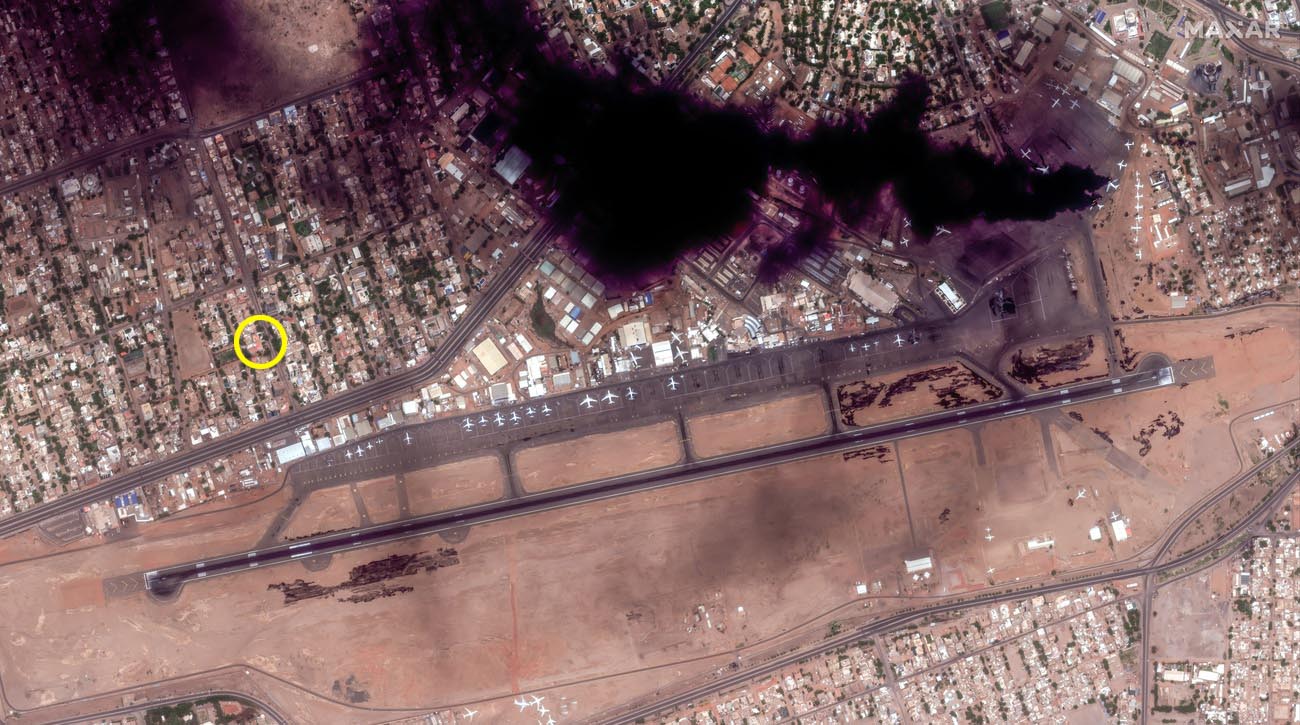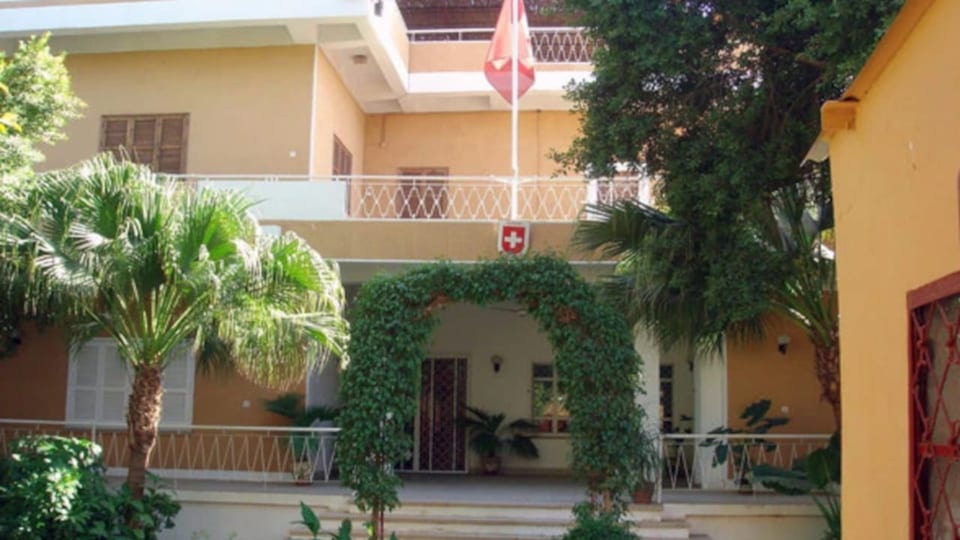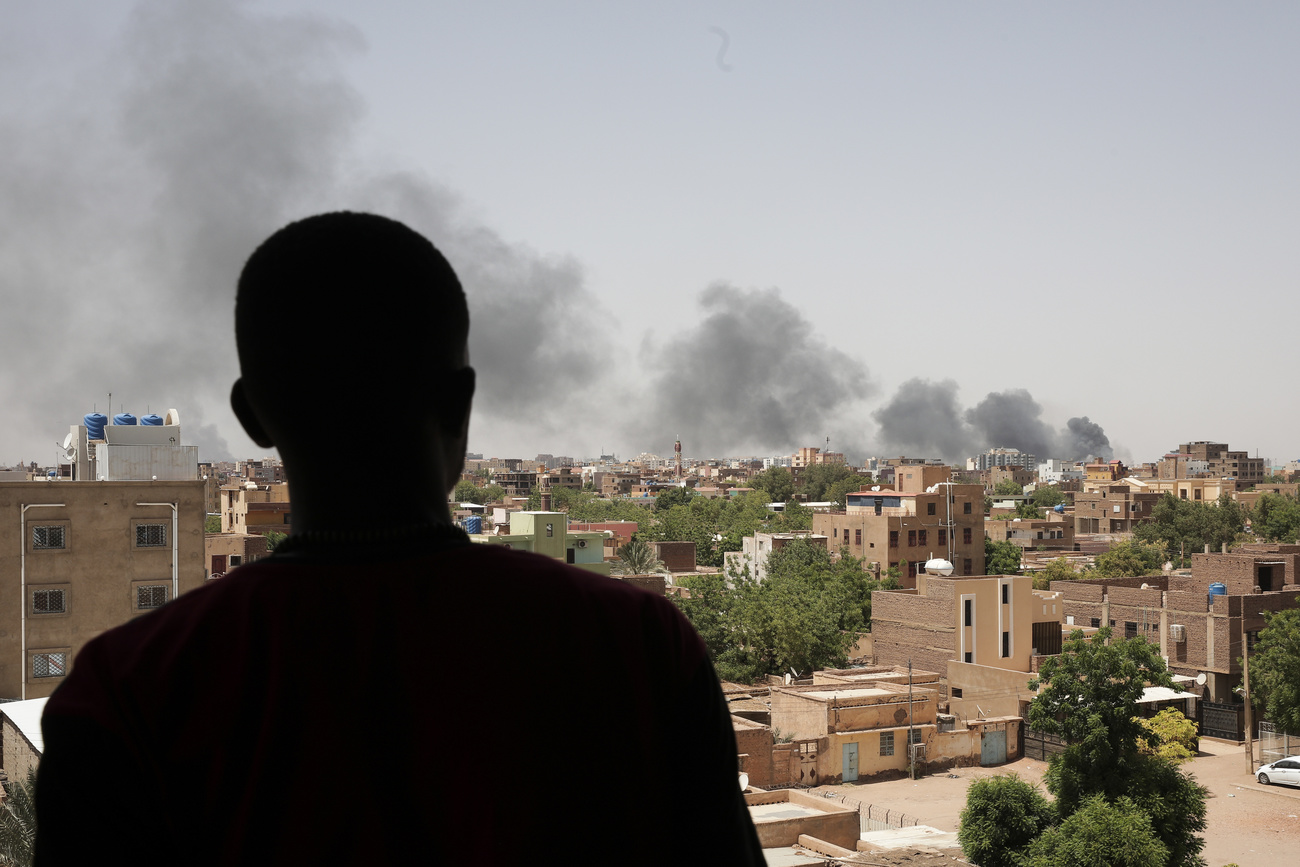
Evacuations out of crisis areas: What you need to know

Expats and travellers who wanted to leave Sudan to flee the political turmoil, ongoing since April 15, could not rely on the help of the Swiss embassy. What kind of aid is Switzerland obliged to provide, if at all? Questions and answers on the recent evacuation operation in Sudan.
Why did the Swiss foreign affairs department come under criticism for its handling of the situation in Sudan?
A Swiss citizen living abroad originally from canton Valais spoke to the newspaper the Tages-Anzeiger about his experience in Sudan during the first few days of the conflict. While other countries informed their citizens abroad promptly by phone, email and through text messages, “Switzerland was quite absent” during the crisis, he said.
There was also criticism within Switzerland about the government not having the ability to carry out the evacuation itself and its reliance on the goodwill of other nations.
How is the foreign ministry equipped for such a crisis?
With its crisis management centre, the Swiss foreign affairs department has procedures in place and can react quickly to various situations. Two apps “Travel Admin” for travellers abroad and “SwissInTouch” for citizens abroad, are the channels with which it can communicate in crisis areas and crisis situations.
What were the challenges in Sudan?
The escalation of violence over the weekend of Saturday April 15 caught Ambassador Christian Winter and the entire embassy staff off guard.
For the next nine days, most of the embassy staff were unable to gain access to the embassy building. And it was only within the building that they would have had communication channels with satellite connections. As such, it was not possible to coordinate an evacuation from Khartoum, and Bern had to take over.
What was the process of communication with the Swiss Abroad?
During the first couple of days following the outbreak of the conflict, there was silence among the Swiss community in Khartoum. After four days, Switzerland was able to bring two female staff members to the embassy thanks to French escorts. “Only then were they able to establish contact with the Swiss community in Sudan,” says the Swiss foreign ministry to SWI swissinfo.ch in an email.

That Tuesday, on April 19, all Swiss nationals in Sudan who had registered with the embassy received information which said, “Due to the difficult security situation, Switzerland has only limited or no possibilities to provide assistance in emergencies.”
Messages had already been sent indirectly through the foreign ministry website and to travellers via a push notification on the Travel Admin app.
This was problematic for several reasons. Firstly, the Confederation was unable to fully comply with two legal principles in the Swiss Abroad Act.
The first principle states that, “every representation is to have a crisis plan, especially in the case of armed conflicts.”
This crisis plan should include embassy occupation – even in the case of an occupation occurring on a weekend. On April 13, two days prior to the outbreak of fighting, the Sudanese army had given a warning that the country was “at a dangerous historical turning point”. Paramilitaries were beginning to pour into the capital Khartoum.
The foreign ministry writes: “Like other countries, partners and international organisations, the staff of the Swiss embassy was also caught by surprise by the turn of events.”
Why does Switzerland set limits on aid?
The second principle of the Swiss Abroad Act states, “The foreign ministry and the representations shall inform natural persons and their relatives in the event of a crisis situation.”
However, a push notification was not sent until the fourth day of hostilities, but it was difficult to access. In response to a request from SWI the department wrote: “The foreign ministry helpline in Bern was always available, 24/7.”
The helpline worked around the clock, says the Swiss foreign ministry. Feedback provided by the department testifies to the commitment of the staff in Bern:
“I thank the helpline team for their continued support from afar,” said one user.
The question remains that if the foreign ministry did inform the Swiss Abroad, they did not actively seek to contact them. For those unable to call Bern, they did not receive much information on services provided to leave Sudan.
How to leave Sudan?
Switzerland’s second push message to its nationals in Khartoum arrived six days after the first, on April 24. Around this time, other countries had already begun military evacuation flights. From this point on, the Confederation was sending multiple messages with information about the possibilities of leaving Sudan from Khartoum in rapid succession.

On May 1 alone, more than 21 information notifications were sent. In total, the Confederation sent 120 text messages and 70 emails to individuals in Sudan.
Even then, information on how to leave Sudan was scarce. Only information on outgoing flights was provided.
Is Switzerland required to evacuate its citizens out of crisis areas?
The short answer is, no. While the idea of solidarity in Switzerland is strong, the law provides for a guarantee exclusion for Swiss living and traveling abroad.
These are clauses 5 and 6 in the Swiss Abroad Act. These clauses enable the Confederation to forego assistance in the case of events of which individuals had been warned. Article 5 states that stays abroad are the responsibility of the citizen. Article 6 creates a legally binding obligation for the travel warnings issued by the foreign ministry.
Who pays for an evacuation?
In principle, such services are chargeable. This applies to evacuees and for the Confederation as well, as flight evacuations have to be organised through other countries.
However, the principle of solidarity rises above all else. Serge Bavaud, head of the Swiss Crisis Centre, says: “During crisis management, we don’t talk about who pays.” The priority is always to carry out the evacuations. Regarding receiving assistance from other European partner states, Foreign Minister Ignazio Cassis says, “One remains in debt. This solidarity is returned at the appropriate moment.”
By the end of April, 50 Swiss living in Sudan were evacuated. So far no bill has been sent to them.
Are there exceptions to the law?
Externally, the Swiss foreign affairs department always invokes the hard letter of the Swiss Abroad Act. But there is also a soft component: increased demands. In recent years, these have led to the Confederation setting more stringent limits against the excessive expectations of the Swiss Abroad.

More
‘Swiss expats’ expectations are too high’
The main proponent of this was the Covid-19 pandemic. The pandemic led to the largest federal recall operation of all time for a total cost of CHF10 million. However, contrary to the evacuation in Sudan, during the pandemic Swiss citizens who chose to return to Switzerland were expected to cover the cost for a flight ticket, albeit at a price set by the Confederation. The pandemic recall operation revealed that the demands of individual citizens abroad were too high. “They ask for things abroad that they wouldn’t even think of asking the state for in Switzerland,” said Johannes Matyassy, director of the consular directorate at the time.

In compliance with the JTI standards
More: SWI swissinfo.ch certified by the Journalism Trust Initiative































You can find an overview of ongoing debates with our journalists here . Please join us!
If you want to start a conversation about a topic raised in this article or want to report factual errors, email us at english@swissinfo.ch.